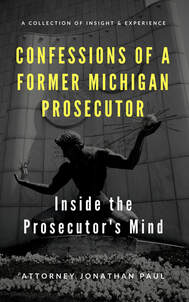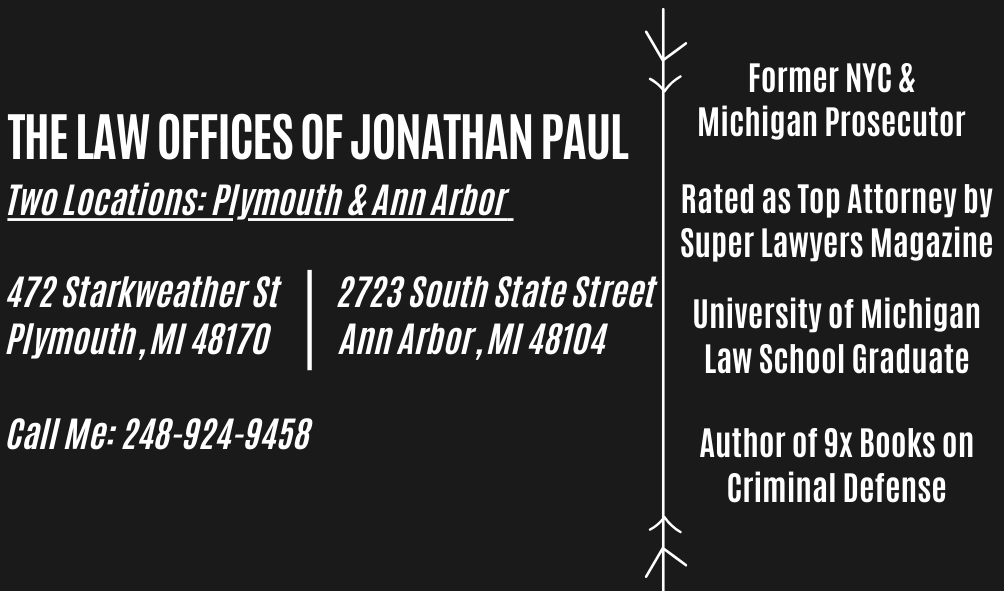Southfield 46th District Court
Domestic Violence/Family Law Survival Guide
Judge Debra Nance |
|
|
If charged with domestic violence in Southfield, Lathrup Village, Beverly Hills, Franklin Village, Bingham Farms, the case will be heard by Judge Debra Nance, Cynthia Arvant and Sheila Johnson who handle the domestic violence cases at the 46th District Court. The prosecutor will either be the City of Southfield, one of the other local prosecutos or an assistant prosecutor from Oakland County Prosecutor's Office, which is lead by Karen McDonald.
Domestic violence is a serious offense in Michigan, and due to the media attention and all of the financial resources and effort that go into combating the "problem", these cases are very challenging when brought before a prosecutor, judge and probation team. As a former prosecutor in New York City and here in Michigan, I was on the other side of 1000's of these cases. I worked hand in hand with the "victims" and witnesses, and had daily contact with the numerous support team/safe haven type of organizations that are in place to work with person allegedly assaulted. These groups do a great job, and they are an excellent resource. I have a lot of respect for the great work that the prosecutors do in Michigan on this domestic violence cases, and pray for anyone impacted by this crime. That being said, domestic violence cases are rigged from day one, and 90 percent of the time are NOT what most people think. Most picture a big strong man beating up a female with injuries and things getting quite dangerous for her life; there are those cases, and those people should be punished if they broke the law; those cases are actually not usually DV cases, but felony charges that carry prison time. I don't work on those cases; there are other attorneys who can help those clients. If you're reading this, you or someone you love and care about has been charged with misdemeanor domestic violence in Michigan. The reality is that most DV cases in Michigan are more mutual than the charges would suggest. It takes two to tango, and it's usually the man who finds himself with the cuffs on and pending charges for a serious crime. I mostly work with three different clients charged with domestic violence. #1 - Client has never been in trouble, they are a good dad/mom, spouse, have a good job and a good reputation in the community. They have never hurt anyone in his life, but an isolated evening turns into a lapse in judgment and the client puts their his hands on the one he/she loves. Client regrets it and the "victim" forgives this lapse in judgment and both parties love each other and want this to go away. The "victim" is not seriously or even injured, but rather was pushed, had an item thrown in their direction, and the police were called to the scene - usually the man gets arrested. #2 - Client and "victim" are arguing; it begins verbally, sometimes alcohol is involved, there's mutual pushing, shoving, maybe some punches, kicks are thrown at each other. Neither party suffers injury, but the police are called to the scene. Both parties are at fault, but only one person, usually the man is arrested. #3 - Client and "victim" are arguing, and things are somewhat mutual, but the victim is the true aggressor and cannot be controlled. Client is doing his/her best to avoid the situation getting worse; client may protect themselves, push the other person, close doors, run, and could be physically assaulted with punches, kicks. The "victim" calls the police and the police arrive with the victim making false/misleading statements about the client, and client arrested. This is 99 percent the man being arrested due to stereotypes and size difference. All three scenarios end up with the same charge, and the same "first impression" being made with the prosecutor, judge and police. That impression is you're a violent person who assaulted someone, you're dangerous and should not be allowed to be around the "victim" or return to where this happened. There's pretty much a zero tolerance; once arrested, you'll be charged and judged by all three in the same way. So how do you survive this heavy storm against you? Well it depends what category the case falls into, and whether or not you believe you're falsely accused, and unfairly charged or if you realize you did something wrong, you regret your actions and just want to make it go away with the least damage to your life and reputation. Let's get this out of the way now; it DOES NOT matter if the "victim" wants to drop the case, it's a crime against the city, township, village, county etc, not really against a second person - that's a civil case - person vs person, this is government vs the defendant. The victim each every DV cases in Michigan speaks to the victim advocate who acts as a buffer with the prosecutor; it's rare that a prosecutor even talks to the "victim". While it's better to have a "victim" wanting to dismiss the case than not, it is not the smoking gun to end the case like most believe. The one area where this desire would help is removing a no-contact order, and getting back in your home. If the "victim" is not on the client's side, my client is unlikely to have any communication with his family for weeks and or months, and will not be back in their home. The client is left to stay with other family, friends or paying for a motel room, which is not "fair" if you're falsely accused, but it's the reality of a domestic violence charge. I've seen it so many times in my career; the "victim" who is either a mutual aggressor or the true aggressor, and my client is charged, can't go to their home, can't see their kids and then the "victim" files for divorce and custody of the kids when they are already buried in a serious criminal case. As you can imagine, a pending DV case is NOT helpful for a divorce or custody issue. You're likely only seeing your kids with supervised parenting time, because of your first impression of violence. So here's the plan depending upon which of the three situations you or someone you love's case falls into. #1 - This client knows they screwed up, the other person is willing to forgive them and move on. I would have my client undergo alcohol and drug testing on day one, especially if it was involved during the incident by the parties. I would also have them enroll in a domestic violence/anger management type program right away. We would leverage these steps along with the "victim's" wishes for my client to return to the home and remove the no-contact order. If granted, I would have my client attend family/couples counseling with the other party on a weekly basis to allow them to sort things out between themselves. Assuming all is going well, I would speak to the prosecutor about a dismissal under a special Michigan program commonly known as 769.4A or the DV 1st offender law, which allows someone to have a non-public record of the incident, keep a clean record and have the case dismissed. Some counties are very tough about getting this deal, some are easier, but the judge must accept it. There's also the option in SOME courts with certain prosecutors where setting the case for trial and the "victim" not showing would get the case dismissed. Some counties and prosecutors will threaten to arrest the "victim" if they fail to answer to the subpoena and show up in court, some will not pursue this, and the case will be dismissed. I know which courts this is a possibility. #2 - If my client was in the wrong, but so was the other person, we might consider exploring a trial to challenge the facts of the case. My client may have been acting in self-defense, or may actually be the victim of domestic violence. If this was more mutual, and we can establish that at trial, a jury or judge may find my client not guilty due to both sides being at fault. |
Former NYC & Michigan Prosecutor
A trial is always risky when you don't control the outcome, and my we would explore the 769.4A deal on this type of case as well - this assumes the "victim" would be agreeable. Another option might be seeking a lower charge like disorderly conduct if I can establish during the pretrial phase that both parties were at fault, which might involve the "victim" speaking to the victim advocate prior to trial and conveying agreement that both parties acted wrong. We would hope to then get this lesser charged dismissed and file a motion to destroy fingerprints and arrest card.
#3 - This is the most difficult situation, because my client is looking me in the eye and saying they did nothing wrong, or the "victim" was the aggressor and should be charged. Essentially the "victim" is lying to the police and my client is falsely accused. This type of case usually means my client is banned from the house, maybe not seeing their kids and struggling with life being upside down. We would be exploring a trial in this situation, but sometimes theres circumstances that make this option a difficult choice. Sometimes a child calls the police or tells the police about the fighting; even if this child says both mom and dad were wrong, it still means they would be called as a witness at a trial. Some clients would rather take the blame for something they didn't do rather than have their children in court testifying against mom and dad. This is also the type of case that the "victim" may file for divorce, a PPO or custody of the kids. They might be trying to take all money, property and assets along with your kids, and we have to fight back both in criminal and family court. One thing working in our favor is if the "victim" is indeed lying, they would be forced to testify under oath at trial, which is subject to perjury, which is a felony. Would the "victim" commit a felony to continue the lie? If the "victim" has not yet filed, I strongly encourage my client to get into family court to get a circuit court judge to grant orders to allow contact with the children and to fight back on custody, support, property and assets before the "victim" begins another legal proceeding against them. Domestic violence cases in Michigan come in all shapes and sizes, but they all appear the same from the view of the prosecutor, judge and police. My clients and I are explore all options, we're aggressive and protect the reputation and lifestyle they've worked so hard to build over the years. It's a difficult time for a family, but it's completely manageable as long as we're able to turn a false first impression into a "true impression" I am very selective in the domestic violence cases that I take into my practice. I am looking for good people who simply found themselves in a bad situation, potentially outside of their own control. These clients have good careers, outstanding reputations, and usually are in a healthy relationship, with a stable home, usually with children. It's my goal to restore order to this family, and help everyone get over the hurdle, and on the right path into the future. I take on cases right after they happen, meaning the potential client is currently in jail, and a family member or friend is reaching out to me, or the potential client has just been released and call me for help. From day one, we make a plan on a number of levels. - Get every piece of evidence, including audio, video, statements, medical reports, police reports etc - Make a plan to have contact with "victim" and children, which means seeking amendment to no contact order - Put proactive steps into place (testing, counseling, programming, education etc) - Explore motion & trial options (bench or jury) vs resolution with negotiation with prosecutor - Explore potential family court action (divorce, custody) issues if applicable and desired - Restore order in my client's life, and take a lesson learned from the case with a long-term plan |






